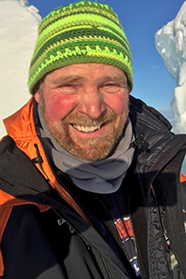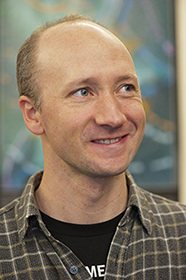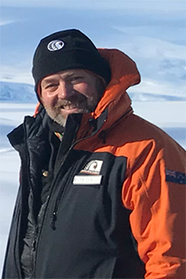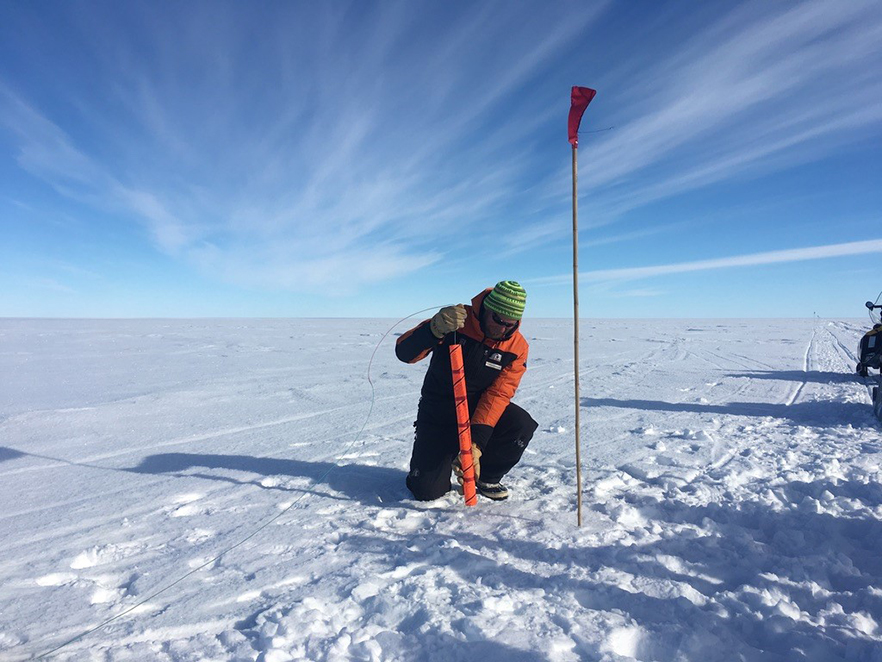The University of Otago Seismic Laboratory – located in the south attics of the Geology Building – is home to a diverse group of staff and students working on a range of geological problems. We collect and analyse seismic data of many forms across New Zealand, in the oceans around the country, and even on the ice shelves and glaciers of Antarctica. Many of our land- and ice-based surveys are conducted in conjunction with micro-gravity studies.
Current research
- Methane Flux Through the Seafloor
- High-frequency marine seismic methods and applications
- Using seismic oceanography to image water masses within the ocean
- Using Reflection Seismology to Characterise Geological Features
- Refraction and Wide-angle Reflection (R/WAR) Studies of the Lithosphere
- Carbon sequestration in New Zealand's southern fiords
Staff
 Professor Andrew Gorman
Professor Andrew Gorman
Andrew has a BSc (1987) from the University of Calgary and a PhD (2000) from the University of British Columbia in Canada. Between the two degrees, he worked in the petroleum industry – mostly for Chevron – in Calgary. Following his PhD he had a postdoc in marine seismology at the University of Wyoming before coming to Otago in 2003.
Andrew's research interests are in the application of seismic imaging techniques to problems of all sorts and scales. He enjoys fieldwork at land and at sea in remote locations like Antarctica, the Sub-Antarctic Island and Fiordland as well as in local urban and nearshore settings. Data collected in such regions can all be analysed and assessed using the state-of-the-art facilities of the University of Otago Seismic Laboratory.
 Hamish Bowman
Hamish Bowman
Computing and Numerical Simulations
Hamish's background in quantitative and numerical studies of marine and ocean settings have transferred incredibly well to research in controlled-source seismology. Hamish supports most of our specialised field and lab software and hardware systems and is an integral part of our research programmes.
 Bob Dagg
Bob Dagg
Technician and Field Support
Bob's main role in the Geology Department is at Otago Repository for Core Analysis (and everything core related!) but we steal him away regularly for geophysical field support on the RV Polaris II and in Antarctica.
Current and recent students
Luke Carrington - MSc
BSc (Otago) - 2018
Research Topic: Seismic imaging of the offshore Akatore Fault near Dunedin
Sebastian Clar – PhD
Diplom (Kiel) - 1995
Research Topic: The use of industry seismic data for seismic oceanography applications east of New Zealand
Joanna Cooper - PhD
BSc (Geology, Calgary) – 2006, BSc (Geophysics, Calgary) – 2006, MSc (Geophysics, Calgary) - 2010
Research topic: Seismic oceanographic imaging of water masses associated with the Sub-tropical Front off the SE coast of the South Island (Co-supervisor: Dr Rob Smith, Marine Science.)
Caitlin Hall – MSc
BSc (Otago) – 2018, BSc Hons. (Otago) - 2019
Research Topic: Integration of gravity and seismic data at the grounding line of the Kamb Ice Stream, Ross Ice Shelf, Antarctica (Co-supervisor: Prof. Gary Wilson, Marine Science.)
Tayla Hill – MSc
BSc (Otago) - 2019
Research Topic: Seismic analysis of ancient landslide processes on the Hikurangi Accretionary Margin (Co-supervised by Joshu Mountjoy and Sally Watson, NIWA)
Justin Lo – MSc
BSc (Otago) - 2017
Research Topic: Reprocessing 1987 vibroseis data from the Moutere Depression (Nelson)
Risa Permatasari – MSc
Bachelor of Physics (Institut Teknologi Bandung, Indonesia) - 2016
Research Topic: Micro-gravity modelling constraints on the geometry and geology of the South Dunedin aquifer
Francesco Turco – PhD
MSc (Trieste) - 2017
Research Topic: Gas hydrates on the Hikurangi Margin (Co-supervised by Gareth Crutchley, GEOMAR)
See Andrew Gorman's webpage for a full list of previous students.
Postgraduate opportunities for geophysics research
We are eager to take on new postgraduate students to work and study in the seismology group at the University of Otago. New Zealand is a fantastic place to study geology in general and geophysics in particular. Please feel free to contact Professor Andrew Gorman with any specific questions.
Software Documentation
- INV1D – 1-D Waveform Inversion Code – J. Korenaga
- PLOTSEC – Refraction Plotting Software (and More) – J. Amor
- RAYINVR – Documentation and Related Programs – C.A. Zelt
- RAYINVR 2.0 – Radial Earth Modifications to RAYINVR – A.R. Gorman
- Tau-P Processing of Seismic Refraction Data – A.R. Gorman
- VE2D22 – 2-D Visco-elastic Finite Difference Modelling – A.R. Levander et al.

Andrew Gorman loading a seismic charge during the 2018/19 field season on the Ross Ice Shelf, Antarctica.
